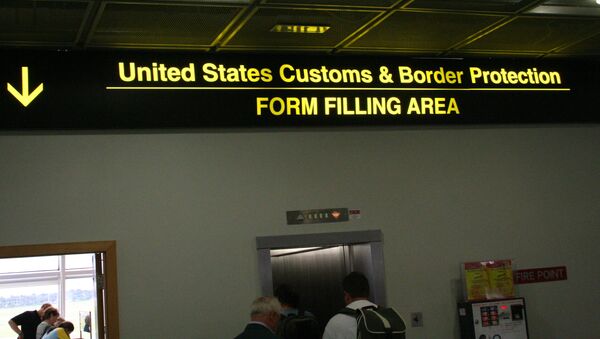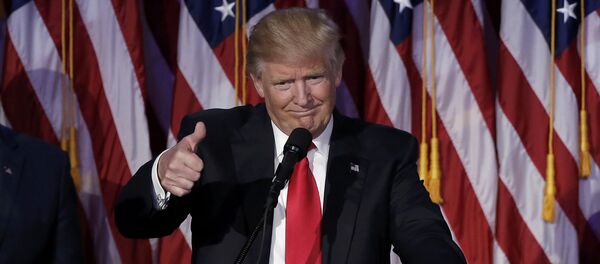WASHINGTON (Sputnik) – “I’m pretty sure he’s going to take out DACA – I’m positive that’s the first thing he’s going to do,” Jacob Hernandez, 25, a DACA recipient, told Sputnik. “The scholarship that I got when I was in community college I had to use a Social Security number, and that’s the one that DACA helped me to use.”
Through the program, which legalized status at least temporarily, Hernandez began establishing a credit history and found a good job.
“It’s thanks to DACA,” he said.
At age 6, Hernandez crossed the border from Mexico with his parents.
“When I came, it was a change because I didn’t know how to speak English, I didn’t know how to read or write. As an elementary-school student coming from Mexico, it was tough,” he recalled.
Hernandez overcame the language barrier and, as a result of Obama's actions, will graduate from the University of Texas at El Paso next May with a bachelor’s degree in civil engineering. He received a full scholarship from a local organization and already has a good-paying job at a lumber company.
All that Hernandez has worked for, however, could be at risk if the program is eliminated, including his legal status.
“It’s going to mean I’m going to get fired from my job,” he said. “You lose everything; they take away your Social Security, your ID, everything. You can’t do anything anymore. If I graduate, I’m going to have a bachelor’s degree, but what am I going to do with it? Nothing.”
If deported, Hernandez would be adrift in a country that is anything but home.
“I’m from Durango – I don’t know anything from Durango, I don’t remember anything; I was 6 years old. I can hardly remember where I lived, that’s about it,” he said. “There are [DACA] people who don’t know [their native] culture, don’t know the language.”
Karely Hernandez, 19, also lives in Texas and is a DACA beneficiary. She arrived in the United States from Mexico when she was 3. Her DACA application was approved last August and she has worked to save money for college. (Program recipients don’t qualify for financial aid for education because they aren’t US citizens.)
Uncertainty over DACA in the Trump administration threatens her future, Hernandez told Sputnik.
Scrapping the program could mean “taking away the one thing that has been very important to me, that has opened a lot of doors for me,” Karely Hernandez said. “It won’t only affect me, it will affect my parents; they might send us all back to Mexico.”
Without DACA, she said, hopes for going to college would be dim.
“It’s going to be really stressful,” Hernandez said. “Before I got the [DACA] permission, I would baby-sit or I would help my mom clean houses.”
Democratic congressman Beto O’Rourke said Obama has the power to issue new executive orders to protect young, undocumented US immigrants from deportation once Trump takes office. At a public meeting this week in the Texas city of El Paso, O’Rourke said that before leaving the White House in January, Obama should “offer a pardon to all of those who are covered under DACA right now – a pardon of civil immigration violations.”
As a precedent, the congressman cited President Jimmy Carter’s 1977 pardon of hundreds of thousands of young American men who had evaded the military draft during the Vietnam War.
DACA has helped nearly 750,000 undocumented immigrants pursue an education or career in the only country many of them have ever known, O’Rourke said. He added that these beneficiaries contribute as much as $4 trillion in taxable income over their lives in the United States.
In addition to a pardon, O’Rourke urged Obama to ensure DACA beneficiaries’ information isn’t used against them for deportation purposes.
“I know these people personally, they have the same story as I do,” he said. “If you’re doing things right, you should be considered an American and be given to the chance to get the American dream. That’s what everyone comes here for.”
Trump’s inauguration as the 45th US president will take place January 20.





